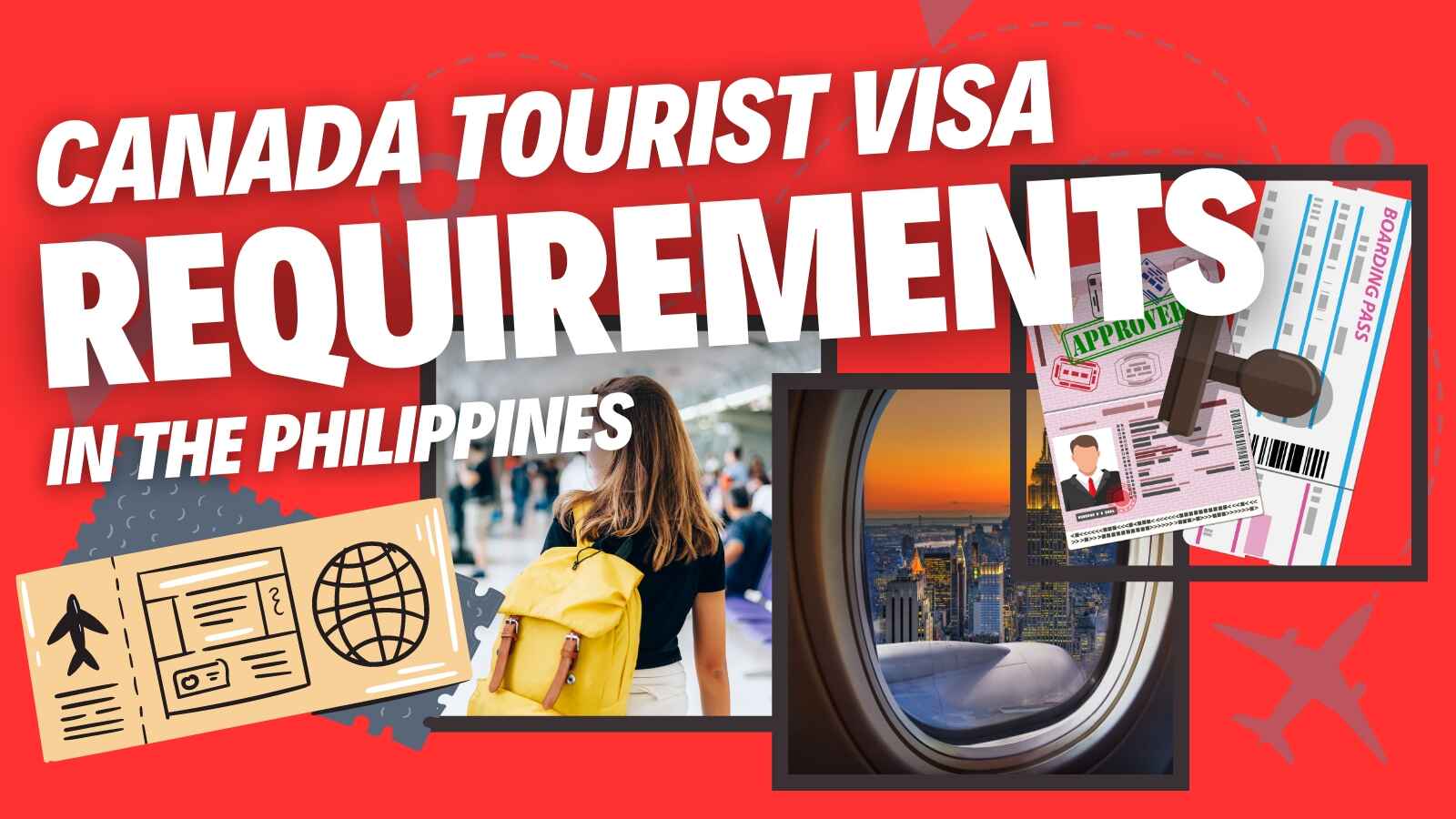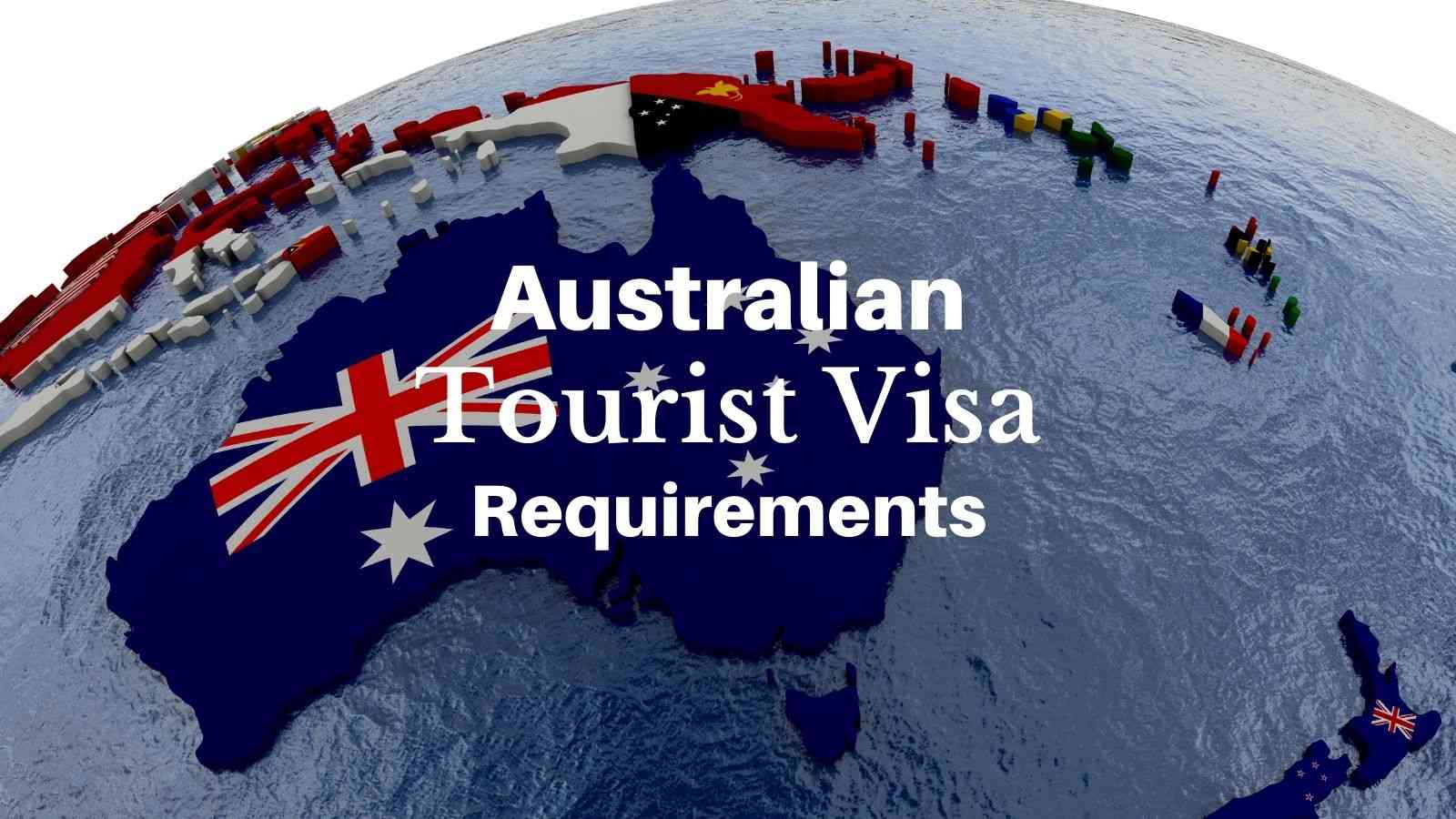Whether you are applying for a job abroad, relocating to a foreign country, or need to validate your documents, obtaining Apostille certificates or DFA authentication is a common requirement by foreign embassy or consulate for legalization.
If you’re like me, the word “Apostille” probably conjures up images of going through a lot of offices and expensive courier service. And while we used an Apostille to get a job in Canada, the process is actually much more mundane—and less stressful.
We share the steps and requirements here before to help fellow Filipinos needing to process their authentication certificates.
What is an Apostille?
Apostille is a form of document authentication that is recognized by foreign countries. It certifies that the document is authentic, genuine, and legally valid. The apostille is affixed to the paper by the DFA and serves as a seal of authenticity.
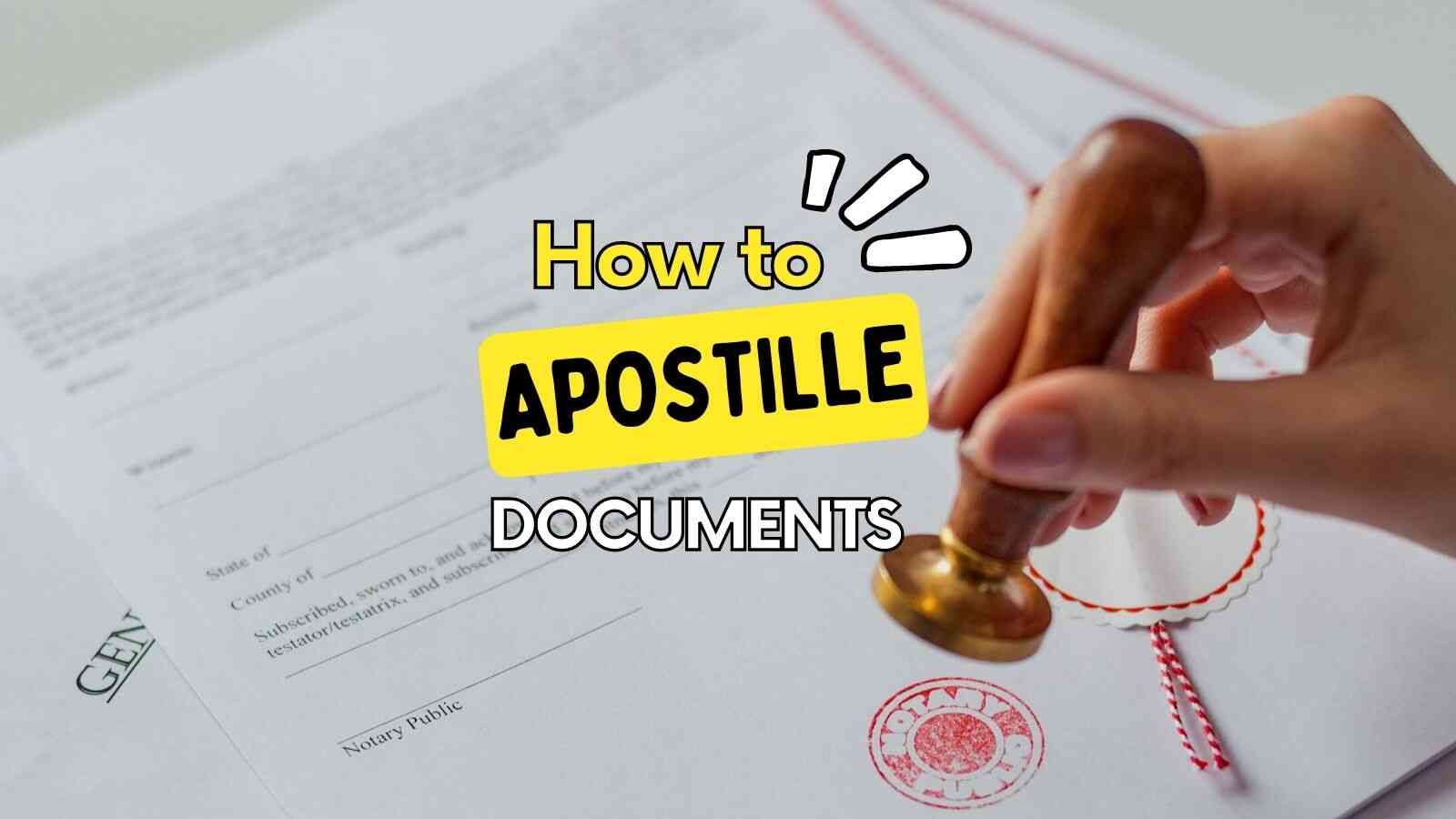
Where Can You Process Apostille in the Philippines?
The Department of Foreign Affairs (DFA) is the sole government agency in the Philippines authorized to provide apostille certificates.
The authentication process used to be known as “red ribbon documents” was replaced with a simplified procedure known as apostille when the Philippines joined the Hague Apostille Convention in 2019.
As a member of the Hague Apostille Convention, Filipinos don’t need to visit numerous government agencies for stamps and signatures for verification and authentication of documents because apostille certificates are already accepted by embassies and consulate offices abroad.
DFA Red Ribbon vs. Apostille Certificate
Apostille and red ribboned documents are two different methods of authenticating documents. An apostille is a certificate that confirms that an official body has authenticated a document in another country.
A red ribbon differs from an apostille because it takes longer to process and includes two ribbons on the document instead of just one. The process consists of going to a foreign country’s consulate in the Philippines to certify the document.
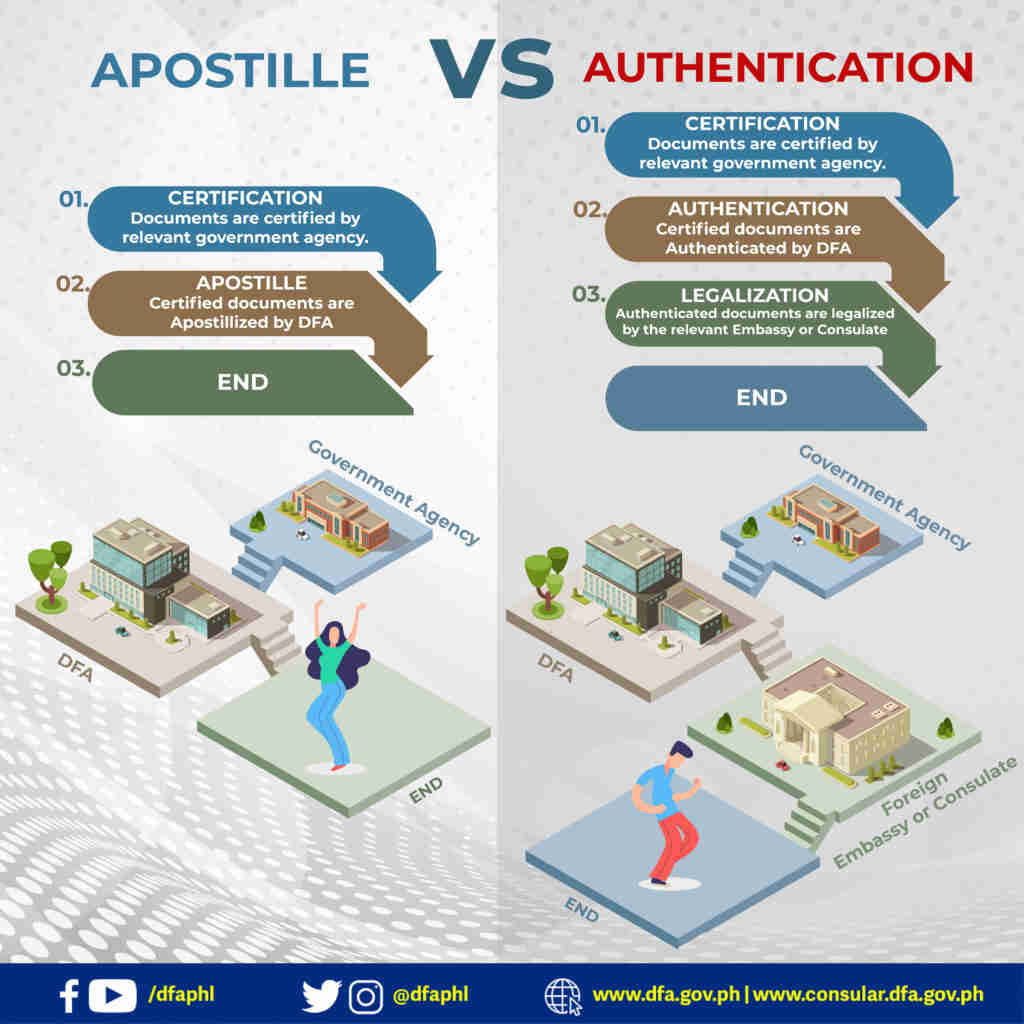
You’ll know the difference between a red-ribboned document compared to apostille. Take a look at the sample process to see their distinctions.
What Countries Accept Apostilled Documents from the Philippines?
The list of countries and territories that are members of the Hague Convention that accept document with an apostille from the Philippines:
- Albania
- Andorra
- Antigua and Barbuda
- Argentina
- Armenia
- Australia
- Azerbaijan
- Bahamas
- Bahrain
- Barbados
- Belarus
- Belgium
- Belize
- Bolivia
- Bosnia and Herzegovina
- Botswana
- Brazil
- Brunei Darussalam
- Bulgaria
- Burundi
- Cape Verde
- Chile
- Colombia
- Cook Islands
- Costa Rica
- Croatia
- Cyprus
- Czech Republic
- Denmark
- Dominica
- Dominican Republic
- Ecuador
- El Salvador
- Estonia
- Eswatini
- Fiji
- France
- Georgia
- Grenada
- Guatemala
- Guyana
- Honduras
- Hong Kong
- Hungary
- Iceland
- India
- Ireland
- Israel
- Italy
- Japan
- Kazakhstan
- Kosovo
- Kyrgyzstan
- Latvia
- Lesotho
- Liberia
- Liechtenstein
- Lithuania
- Luxembourg
- Macau
- Macedonia
- Malawi
- Malta
- Marshall Islands
- Mauritius
- Mexico
- Moldova
- Monaco
- Mongolia
- Montenegro
- Morocco
- Namibia
- Netherlands
- New Zealand
- Nicaragua
- Niue
- Norway
- Oman
- Panama
- Paraguay
- Peru
- Poland
- Portugal
- Romania
- Russia
- Saint Kitts and Nevis
- Saint Lucia
- Saint Vincent and the Grenadines
- Samoa
- San Marino
- Sao Tome and Principe
- Saudi Arabia
- Serbia
- Seychelles
- Slovakia
- Slovenia
- South Africa
- South Korea
- Spain
- Suriname
- Sweden
- Switzerland
- Tajikistan
- Tonga
- Trinidad and Tobago
- Tunisia
- Turkey
- Ukraine
- United Kingdom of Great Britain and Northern Ireland
- United States of America
- Uruguay
- Uzbekistan
- Vanuatu
- Venezuela
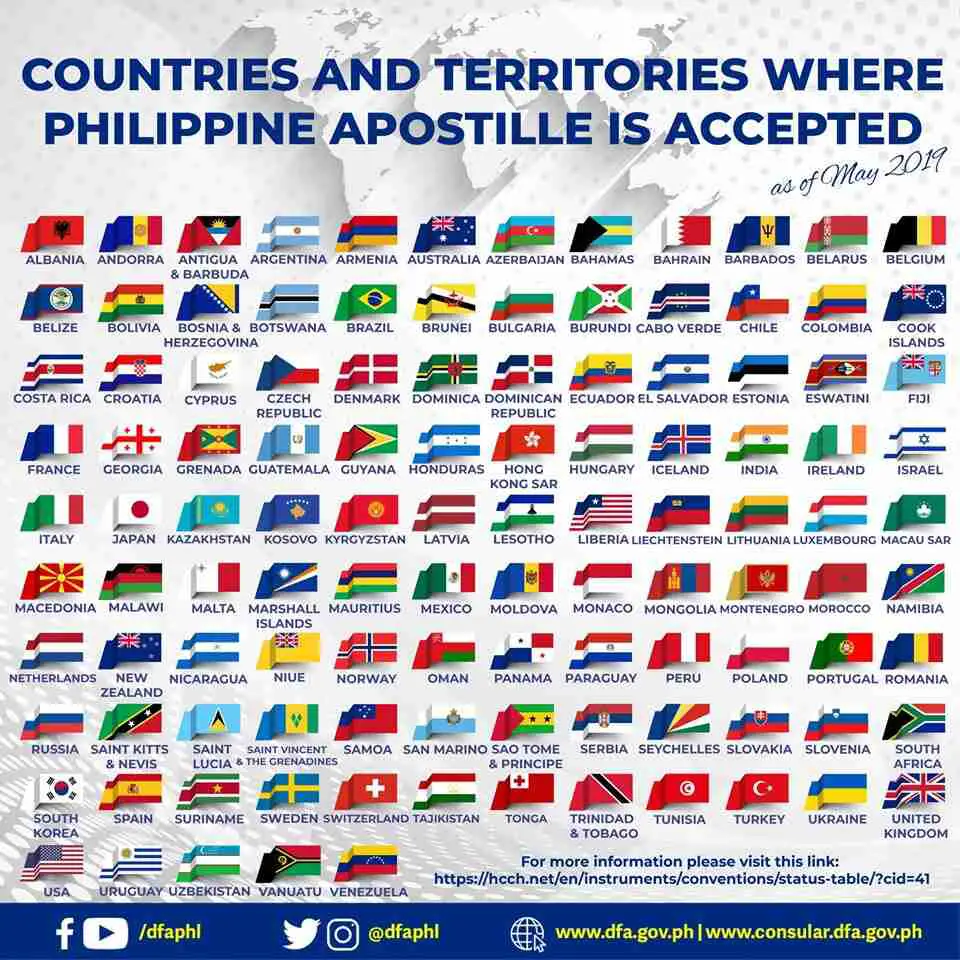
List of Documents Allowed for DFA Apostille and Authentication:
Form-137 and Diploma (For Elementary and High School Level)
- Certified True Copies from the school; and
- Certification, Authentication and Verification (CAV) from DepEd Regional Office where the school is located
Transcript of Records (TOR) and Diploma (For State Colleges and Universities)
- Certified True Copies of the documents
- Certification, Authentication and Verification (CAV) from the school signed or sealed by the school or university registrar or the school’s authorized signatory
Transcript of Records (TOR) and Diploma (For Private or Local Colleges and Universities)
- Certified True Copies of the documents issued by the school
- Certification, Authentication and Verification (CAV) from the Commission on Higher Education (CHED) where the school is located
Transcript of Records (TOR) and Diploma or National Certificate (For Technical and Vocational Courses)
- Certified True Copies from the school
- Certification, Authentication and Verification (CAV) from TESDA (Technical Education and Skills Development Authority), where the school is located
PRC Licenses, Board Certificates, Board Ratings, Certifications, and other PRC documents
- Original or Certified True Copies from the PRC (Professional Regulations Commission)
Birth, Marriage, Death Certificate, Certificate of No Marriage Record (CENOMAR, Advisory on Marriage or Negative Records)
- Original document issued by Philippine Statistics Authority (PSA) or National Statistics Office (NSO)
- For newly registered records, Local Civil Registrar (LCR) copy should be certified by PSA
Note: Provide an LCR copy of Birth (Form 1A)/Death (Form 2A)/Marriage (Form 3A) Certificate if the entries from PSA/NSO are UNCLEAR
NBI Clearance
- Original document issued by National Bureau of Investigation (NBI) with dry seal
Note: The DFA does not accept personal copies.
Driver’s License
- Certification from Land Transportation Office (LTO Main and Regional Offices only)
Civil Aviation Authority (CAAP) issued documents
- The document must be certified by the CAAP
Medical Certificates
- For employment: DOH stamp per document
- For other purposes: Certification issued by DOH with attached Medical Certificate
Certificate of Employment, Training, Seminars, Baptismal Certificates, and other documents issued by a private entity
- Notarized Affidavit stating necessary factual circumstances and indicating certificate/s as attachment/s
- Certificate of Authority for a Notarial Act (CANA) signed by the Executive Judge/Vice-Executive Judge/any office with authorized signatories (issued by the Regional Trial Court)
Note: The affiant’s (person who executed the affidavit) name will be reflected on the Apostille’s caption.
Special Power of Attorney, Affidavit of Consent or Advice, Joint Affidavit, etc.
- Certificate of Authority for a Notarial Act (CANA) signed by the Executive Judge/Vice-Executive Judge (issued by the Regional Trial Court)
Memorandum of Agreement, Memorandum of Understanding or any other form of contract
- Notarized Affidavit stating necessary factual circumstances and indicating certificate/s as attachment/s or a jurat from the notary public on the document
- Certificate of Authority for a Notarial Act (CANA) signed by the Executive Judge/Vice-Executive Judge (issued by the Regional Trial Court)
Note: A copy of Notarial Commission is not the same as a Certificate of Authority for a Notarial Act. Clerks of Court may not sign the CANA as the certifying official (SC OCA Circular No. 27-2007)
Court Documents
- Certified True Copies from the Court
Immigration Records
- Certified by the Bureau of Immigration (BI)
DSWD Clearance
- Original document issued by the DSWD (Department of Social Welfare and Development)
Police Clearance / Sundry
- Original document issued by Philippine National Police (PNP)
Business Registration and Other Documents issued by a Government Agency (example: SEC, DTI, BIR, SSS, Municipal Business Permit & Licensing Office, etc.)
- Certified true copy from the issuing office
Barangay Clearance or Certificate
- Mayor’s certification or clearance, which has jurisdiction over the Barangay
Export Documents
- Certified by the Philippine Chamber of Commerce (PCCI), Department of Health (DOH), Department of Agriculture (DA), or the Bureau of Food and Drugs (BFAD), depending on the nature of the document
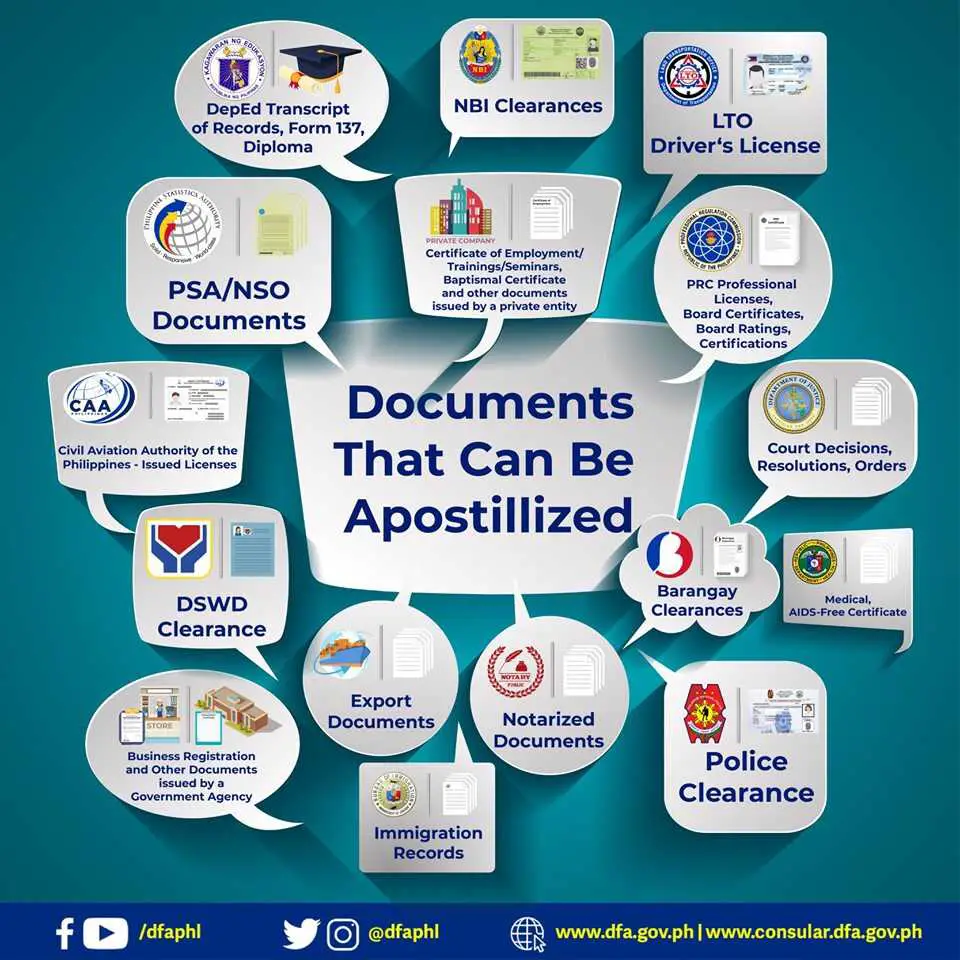
How to Apostille Documents in DFA Philippines (Step-by-step Process)
Step 1: Schedule an Apostille Appointment in DFA Online
How to get an appointment in DFA for apostille is quickly done online. Many DFA branches launched an online appointment platform to serve DFA authentication and apostille. Select your DFA Consular Office and schedule from the available time slots. Confirm the date and time. Complete your information and indicate which document you want to apostille. The DFA will email your confirmed appointment.
- DFA Aseana
- DFA SM Megamall
- DFA SM Manila
- DFA in Metro Gaisano Alabang
- DFA Alimall, Cubao
- DFA San Fernando, Pampanga (Robinsons Starmills)
- DFA SM Davao
- DFA Iloilo
- DFA Consular Office in Cebu
Step 2: Attend your Apostille Appointment at your DFA Branch
Print your confirmed appointment and present it at the DFA office on the date of your apostille schedule. Fill out the DFA Authentication application form. The DFA accepts a maximum of 5 documents per applicant for authentication.
In case you cannot attend your DFA appointment, you need to submit a request to cancel your appointment three days before the confirmed date. Email your cancellation request to oca.authentication@dfa.gov.ph.
Step 3: Submit your documents
Present your valid ID, application form, and the documents you want to authenticate or apostille. The authenticating officer will check whether you have submitted all the required documents.
Step 4: Pay the DFA Authentication Fee
The Department of Foreign Affairs charges P100 per document for authentication for regular processing (released within four business days) and P200 for express or rush processing (released after one business day).
The cost of DFA Apostille and DFA Authentication Process is posted in this table.
Step 5: Claim your DFA Apostilled Certificate
Your authenticated document’s release date and time will be stamped on the official receipt issued by the DFA after you pay the processing fee. Go to the Releasing Window of the Authentication Section and present your valid ID and official receipt to claim your documents.
If you’re an authorized representative, you must present a Special Power of Attorney and valid ID to claim someone else’s authenticated documents.
What are the Requirements to Get an Apostille in DFA Philippines?
1. One valid government-issued ID or any of the following:
- Passport
- SSS UMID Card
- GSIS UMID Card
- PRC ID
- LTO Driver’s License
- OWWA ID
- Senior Citizen’s ID
- PWD ID Card
- Solo Parent ID
- Voter’s ID
- Postal ID
- School ID (for elementary, high school, and college students)
- Employment ID
- Airman License
- Seafarer’s Record Book
2. Original copy of the document you want to apostille or authenticated (see the list mentioned above)
3. DFA Apostille Authorization Letter (for authorized representative):
- Authorization letter from the owner of the document
- Photocopy of the applicant’s valid ID
- Original and photocopy of the authorized representative’s valid ID
- Original Special Power of Attorney from the parents (if the applicant is a minor)
How to Verify the Authenticity of Apostilled Document in the Philippines?
You can verify the authenticity of an apostilled document online. The DFA launched an excellent platform that can be used by embassies and consulate offices or anyone who wants to check whether their authenticated certificates are legit. Do the following steps:
- Visit the DFA verification platform
- Type your Apostille No. (example: 20A-00000000)
- Enter your Keycode (example: 62A583AB15031)
- Click “SEARCH”
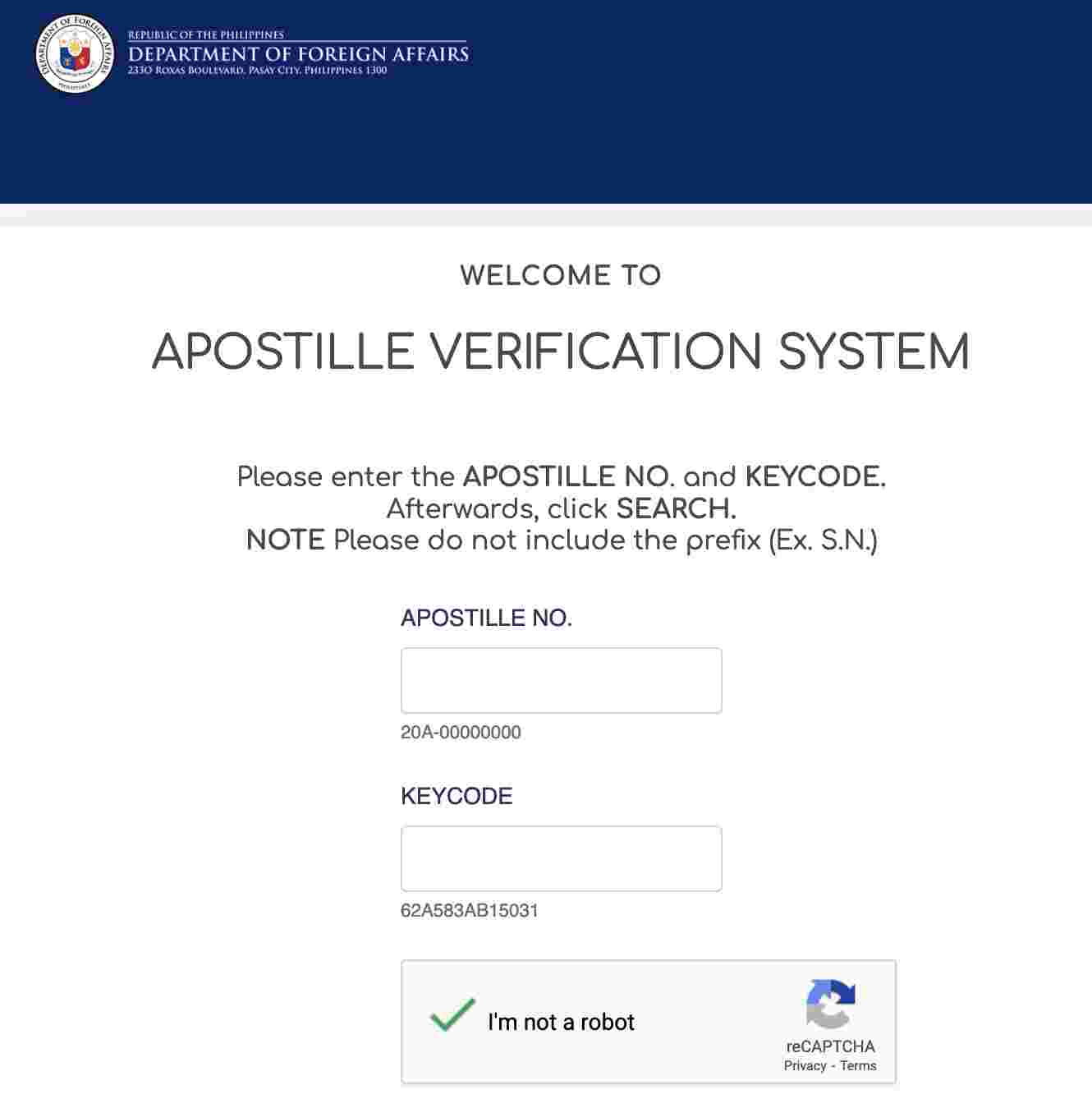
Another method is to scan the QR code on your Apostille Certificate using your smartphone.
FAQs About Apostille and DFA Authentication:
How to process apostille in DFA online?
While setting an appointment is done online, the succeeding procedure to apostille documents shall be done in person at the DFA consular office, confirmed by the applicant. Follow the five steps here: how to get an apostille certificate in the Philippines.
Can I authorize someone to get an apostille certificate for me?
Yes, you can authorize a representative to process and claim an Apostille. Your representative must bring an authorization letter with a photocopy of your valid ID, original, and photocopy of their valid ID.
What will happen to unclaimed Apostille documents or certificates?
According to the Department of Foreign Affairs (DFA), all unclaimed documents in the Philippines will be disposed of after three months from the scheduled release date.
Can I apostille my documents through a courier service?
Yes, DHL in the Philippines process apostille documents and deliver authenticated papers to embassies of other countries. You may also track the status of your documents.
How long is the validity of DFA authenticated documents?
According to the DFA, authenticated documents have a validity of five years.
How can you authenticate a document if the requesting country is not an apostille country?
Suppose your document is to be used in a country that does not recognize the Apostille Convention. In that case, you should contact the Embassy or Consulate of that country to find out whether it will accept your documents. If your paper requires an apostille, you may need to present it to their embassy or consulate in the Philippines for legalization. Or ask the recipient if an apostille is necessary for their legal recognition.
Related Articles:
How to Process WES Documents from the Philippines to Canada
Top 5 Best TVL Strands and Courses
